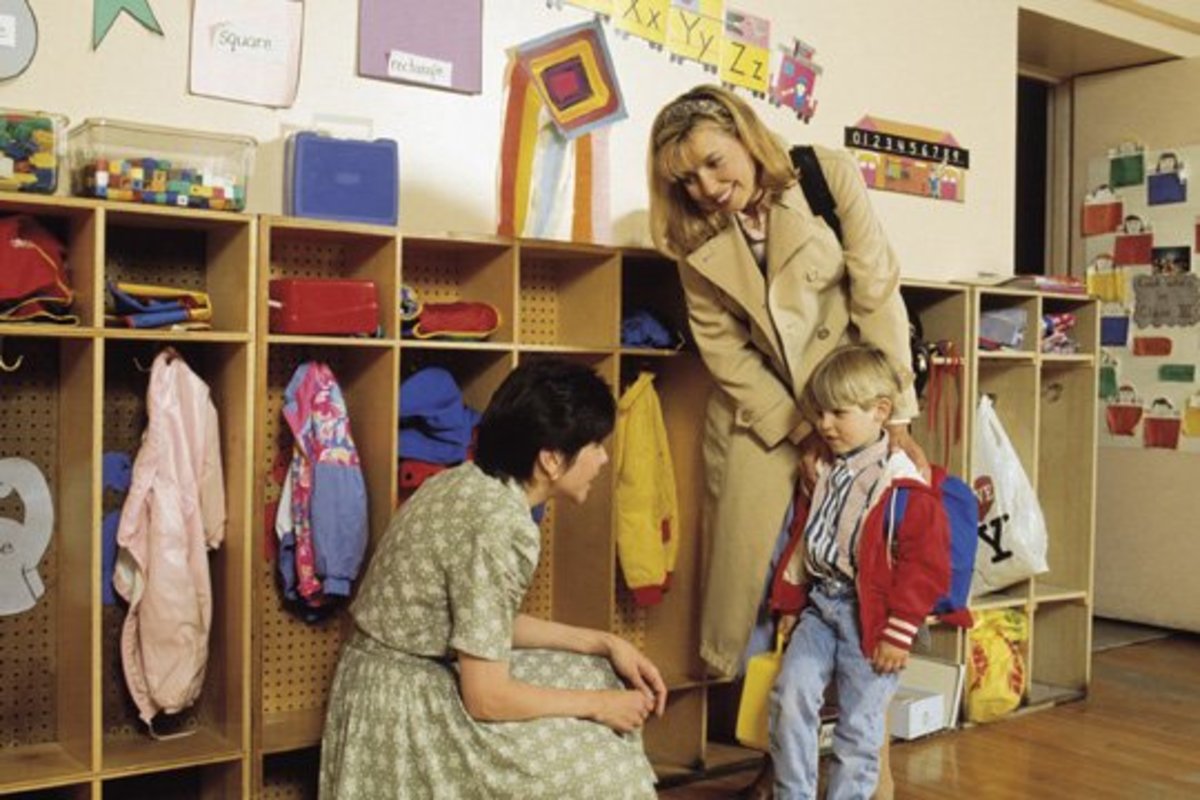Dealing with School Phobia and Separation Anxiety
For any child and parent, the first day of school can bring a mixture of excitement and anxiety. Many children look forward to it and simply can’t wait to be with all the other children. For others, there is dread at the thought of leaving mummy and not seeing her for a long time.
Some may have attended a day nursery already and be comfortable with the idea of being at school all day, whilst others may have not attended nursery at all. There will also be a few who have tried nursery but had such a bad separation anxiety, that a parent pulled them out and admitted defeat

What is School Phobia?
In this article, I would like to discuss what is perceived to be separation anxiety and school phobia, whilst offering tips on how to deal with these problems, in particular for ages four to seven years and teenage years.
There is some debate about the term “school phobia”, and it is becoming increasingly known as “school refusal”. There is also debate about what actually constitutes being labeled a school phobic. It is my opinion that in cases of school refusal, the telling factor in establishing a true phobia will obviously be in the reasons for refusing. A phobia must be rooted in an irrational fear of something.
Labeling a child with an illness doesn’t sit well with some professionals or parents and ironically can actually encourage the so called phobic behaviour to continue. If it is a recognized medical diagnosis, then the behaviour is justified to the child. Parents may even be less likely to take responsibility for the problem if a school phobia is diagnosed. It is a stressful business for parents knowing that it is compulsory for your child to attend school but not being able to get them there or keep them in school.
Signs of School Phobia
- Not wanting to talk about school
- Vague aches and pains, usually stomach aches or headache
- Sleep problems – nightmares
- Refusal to go to school – anger, hiding, crying, blackmail
- Not wanting to leave parent – being clingy
- Other irrational fears at home
- Increase in naughty behaviour and defiance

Reasons for School Phobia
The trouble with calling school refusal a school phobia, is that the very name suggests it is an irrational fear about something happening in the school itself, but often the reasons can be associated with problems at home or a generalized anxiety problem.
Some common reasons are:
- Separation from parent – separation anxiety
- Fear of a teacher or teachers – feeling disliked by or fear of authority, feeling bullied by a teacher
- Learning problems – attention disorder, underachieving, gifted frustration
- Peer problems – not making friends, bullying
- Sibling at home – jealousy of a younger sibling at home
- General anxiety – may have other fears such as undressing for PE, worried about home life, concern for safety of parent, returning after long absence
- Feeling different to other children – much smaller than peers, ginger hair, physical illness
Books for Parents - School Refusal and Separation Anxiety
How to Deal With School Phobia
For many parents the reason may be obvious, such as having to have prolonged spells off school for a chronic physical illness or having already had issues about clinginess before the start of full time school. Some children will be forthcoming in speaking about their fears, whilst others will be secretive. It is up to the parent to talk to their child and ascertain what is worrying them. Having determined the cause, a parent can then hope to help their child and get any support if necessary.
Separation Anxiety
We can see that separation anxiety could provoke a label of school phobia. The fear is actually about feeling insecure at school without the parent being present, but a true phobia about actual school life would still exist if the parent was present. A good way to distinguish if separation anxiety exists is to have the parent present for a few days, although this may be unwarranted as most parents and teachers recognize that separation is the issue.
Parents Need to Talk to Teachers

Fear of Teachers or Authority
If a child feels they are disliked by a teacher and is afraid of punishment, the best thing to do is see the head teacher to discuss it. Child bullying by teachers is extremely rare but can happen in a not too obvious way. With younger children, they might simply be afraid of other adults and being disciplined by them. Perhaps your child can have a safe teacher; someone who they like that they can share their feelings with when fearful. The same can be said of peer bullying and of course, the bully or bullies need to be disciplined.
Learning Problems
ADHD or ADD is a cause of learning problems and needs to be addressed by initially talking to the teacher. This condition and other behavioural conditions have sometimes been diagnosed and addressed before the start of school however. The support from a school psychologist may be sought and your child may need special one to one tutoring with a teacher or even a special school. Special learning disability teachers are usually assigned in most schools in the UK. Parents should remember how much a little praise can go a long way in building a child’s self-esteem and confidence. Encouragement without pressure can be key to helping your child.
It may just be that your child is falling behind a little and needs some gentle encouragement. A chat with their teacher and drawing up a plan to catch up may be all that is needed.
Relate Family Counselling UK
Sibling Jealousy
This is usually connected to separation anxiety and often resolves itself in time but there are some things you can try. Make a fuss when the child returns home from school because they are big sister/ big brother and are lucky to be at school when the other sibling is bored at home. A little reverse psychology can help! Don’t talk about your day but do make a big thing of the school child’s day, and especially take time out after the evening meal to sit with your child and have a chat about school, play a game or read.
Other tips for School Phobia
- Talk to your child and really listen to what they have to say. Find out what the root problem is, and if it is something you can not deal with, ask for help in dealing with the problem. It is an offence in the UK to keep your children away from school but the head teacher will be receptive to helping you find the support you need.
- If there are problems in the home and you feel this may have something to do with your child’s behaviour, then you can seek family counseling.
- Show a keen interest in your child’s schooling without being overpowering.
- Be honest in telling them what you liked or didn’t like at school and relay your stories of school (the good stories!).
- Try to pick up on something they do like at school and build on that.
Books For Children Starting School
Separation Anxiety
Separation anxiety is quite common in the four to seven year age bracket and it does have a habit of resolving itself eventually. Out of my four children, only one had this kind of anxiety when starting school, but she was simply very shy compared to my other children. She found school overwhelming. Parents can feel guilty leaving their children but often the best way for all concerned is to stay firm and consistent.
As a child, I remember well the tears that flowed, as I watched my mother walking away from the school gates each morning. My teacher would take my hand and lead me into class, with what appeared to be an ignorance of my plight. It worked! No attention was drawn to my sadness and within a few weeks I had “settled down”. I do know that it often hurts the parent to see their child in tears, but sometimes the problem can be made worse by an over protection and a visibly anxious parent.
A child will pick up on your reaction to their anxiety so it is important not to be too dramatic or appear too worried in front of them. Here are some other things you can try:
Good Separation Anxiety Advice Video
Tips for Dealing with Separation Anxiety
- Talk to the teacher so that the school is aware of the problem
- Give your child a photograph of you or the family to keep in their bag.
- Take your child to the doctor to make sure there is nothing physically wrong with them
- Smaller children tend to respond well to rewards and a promised treat at the weekend is a good idea
- Encourage friendships at school by having someone in their class over for a meal or just to play
- Ask a parent with a child in the same class as yours if you can go to school together
- Spend quality time with your child in the evenings
- Give gentle reassurance that you will be there when school finishes
For severe cases, ask at the school if you can expose them to school more slowly for the first few weeks and also if your child may be allowed to ring you at lunch time.
Are you breaking the law when your child misses school?
- School attendance and absence: the law : Directgov - Parents
Information on parents' legal responsibilities to do with school attendance and the potential consequences of truancy - including penalty notices, parenting orders and education supervision orders
Refusing to Leave the House for School
Of course, many children of all ages simply refuse to leave the house to go to school and this can become a major problem. Smaller children are easier to handle in this scenario than teenagers. It’s hard to physically make someone go out of a door! Working parents have a particularly hard time because they have to leave the house for work and the last thing they want is a child of any age refusing to get out of bed or get dressed.
If all this becomes too difficult to shoulder on your own, you need to have a good relationship with the school and possibly seek outside help with counselors .Some schools have a counselor but some don’t, so you may have to pay for private counseling…if you can get the older child to agree to this! The Educational Welfare Department may become involved as refusing to attend school at all is akin to truancy and is against the law.
A teenager refusing to go to school poses bigger problems as work is missed. The longer this goes on, the more hopeless it all appears. Sometimes refusing to go to school can just be about being disinterested in school and this is the worst case scenario. It is not a phobia and prosecution is happening all the time in the UK.










